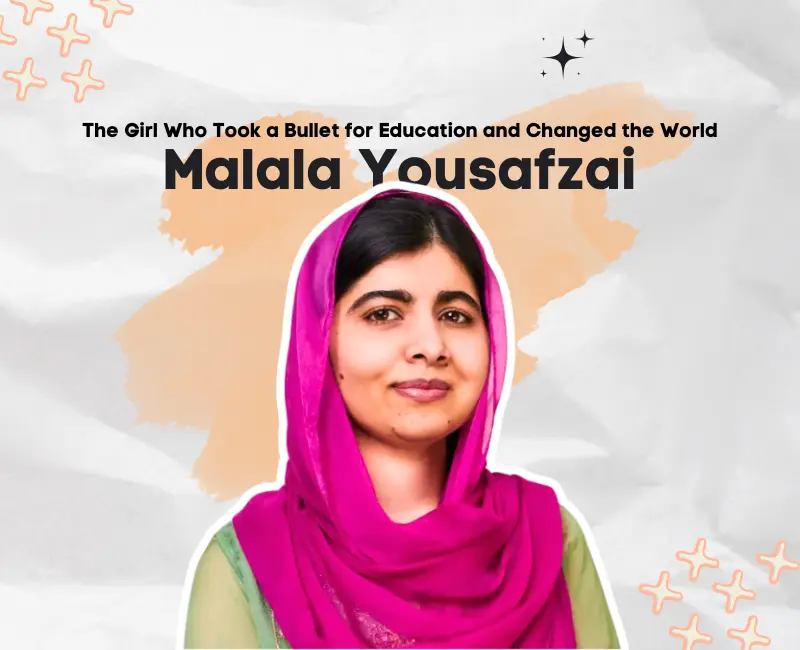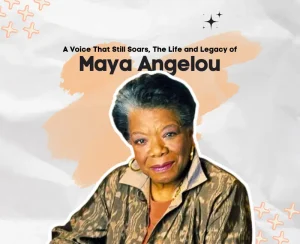Malala Yousafzai The Girl Who Took a Bullet for Education and Changed the World

Malala Yousafzai is a global icon of courage, resilience, and educational advocacy. Born on July 12, 1997, in Pakistan’s Swat Valley, Malala grew up in a region plagued by violence and oppression under the Taliban’s rule. From an early age, her father, an educator, inspired her to champion the right to education for all, especially for girls.
Her journey as an activist began at just 11 years old when she wrote an anonymous blog for the BBC Urdu, detailing her life under the Taliban and her determination to continue her schooling. This bold act brought her global attention—and significant danger. On October 9, 2012, Malala was shot in the head by a Taliban gunman, an attack that shocked the world.
Miraculously surviving, Malala refused to be silenced. Instead, she emerged as a powerful educational advocate, co-founding the Malala Fund and addressing global leaders on the importance of learning. In 2014, she became the youngest-ever Nobel Peace Prize laureate at 17. Today, Malala remains a beacon of hope, inspiring millions with her belief that education is the key to transforming lives and breaking cycles of poverty and oppression.
Early Life and Education
Malala Yousafzai was born on July 12, 1997, in the picturesque Swat Valley of Pakistan, a region known for its natural beauty but later marred by violence and extremism. Raised in Mingora, the largest city in Swat, Malala grew up in a household that deeply valued education and equality. Her father, Ziauddin Yousafzai, was a passionate educator who ran a school and believed firmly in the right of every child—boy or girl—to receive an education. Unlike many in their conservative Pashtun community, Ziauddin encouraged Malala to speak out, think critically, and pursue her dreams without limits. Her father’s activism profoundly influenced her, shaping her views on education and human rights from an early age.
Malala’s early education took place at her father’s school, where she thrived as a bright and inquisitive student. She excelled academically and developed a love for public speaking, often participating in debates and addressing social issues. Even as a young girl, Malala was acutely aware of the challenges many girls in her community faced in accessing education. She saw firsthand how societal norms and financial hardships often prevented girls from attending school. These experiences sparked a deep desire in her to fight for the rights of others, setting the foundation for her later activism.
The situation in Swat Valley began to deteriorate in 2007 when the Taliban gained control of the region. They imposed a strict interpretation of Islamic law, banning television, music, and, most devastatingly for Malala, girls’ education. Schools for girls were systematically shut down, and those who defied the ban faced severe punishment. Despite the growing dangers, Ziauddin kept his school open, and Malala continued to attend classes. Witnessing the Taliban’s efforts to silence women and suppress education ignited a fierce determination in Malala to resist. She began speaking out publicly, advocating for girls’ education in interviews and public forums, a bold move for someone so young.
In 2009, at the age of 11, Malala began writing an anonymous blog for the BBC Urdu under the pseudonym Gul Makai. In her entries, she detailed her fears of losing her education, the impact of Taliban rule on her life, and her dreams of becoming a doctor. Her words resonated with readers worldwide, offering a rare and poignant glimpse into life under Taliban oppression. Despite her anonymity, Malala’s activism made her a rising figure in the fight for education in Pakistan. Encouraged by her father, she gave television interviews and public speeches, urging others to join her cause. Her courage and clarity as a child advocating for a fundamental right inspired people both locally and internationally, but it also drew the ire of those who opposed her message.
Malala’s early life was marked by challenges that might have silenced others, but instead, they fueled her resolve. Her father’s unwavering support and her innate sense of justice enabled her to stand up against powerful forces, laying the groundwork for her eventual emergence as a global advocate for education.
The Attack That Shook the World
On October 9, 2012, Malala Yousafzai faced a life-changing and nearly fatal attack that would propel her story into global consciousness. At just 15 years old, Malala had already made waves as a vocal advocate for girls’ education in the Taliban-dominated Swat Valley of Pakistan. Her anonymous blog for BBC Urdu, written under the pseudonym Gul Makai, had detailed the struggles of living under Taliban rule, including the fear and restrictions placed on women and girls. Her courage to speak out, even in such perilous circumstances, earned her local admiration but also drew the ire of the Taliban, who viewed her activism as a direct challenge to their authority.
The attack occurred as Malala was returning home from school on a bus. A Taliban gunman boarded the vehicle and demanded to know which of the students was Malala. Despite the overwhelming fear, her classmates’ silence was not enough to protect her. The gunman fired three shots, one of which struck Malala in the head, near her left eye, and lodged in her shoulder. Two of her friends were also injured in the attack. The brutal assault was an attempt to silence her advocacy, but instead, it brought her cause global attention.
Malala’s survival was nothing short of miraculous. Initially treated in Pakistan, she was later airlifted to Birmingham, United Kingdom, for specialized care. Doctors performed several surgeries to repair her skull and restore her hearing, which had been damaged in the attack. The road to recovery was long and challenging, but Malala’s determination never wavered. Rather than being defeated by the violence, she emerged stronger, driven by a renewed purpose to fight for the right of every child to receive an education. The global outrage sparked by the attack united people across cultures, religions, and nations in support of her cause.
The attack that was meant to silence Malala instead amplified her voice to a global audience. It highlighted the dire conditions faced by millions of girls denied education due to conflict, discrimination, or cultural restrictions. Leaders worldwide condemned the Taliban’s actions, and Malala received widespread support from governments, organizations, and individuals. The incident also underscored the risks faced by activists in oppressive regimes. For Malala, the experience transformed her from a local advocate into an international symbol of resilience and the fight for education rights. Far from deterring her, the attack became the catalyst for a global movement that continues to empower girls and champion education as a fundamental human right.
The Attack That Shook the World
Following her recovery from the life-threatening attack in 2012, Malala Yousafzai transformed her personal tragedy into a global movement for education. Refusing to be silenced by fear, she dedicated herself to ensuring that children worldwide, particularly girls, have access to education. In 2013, Malala co-founded the Malala Fund alongside her father, Ziauddin Yousafzai. This nonprofit organization focuses on advocating for 12 years of free, safe, and quality education for every child. Through the fund, Malala has supported educational initiatives in various countries, including Nigeria, Afghanistan, and Syria, where systemic barriers and conflict disproportionately affect girls’ education. Her work emphasizes collaboration with local educators and activists to create sustainable, impactful solutions.
Malala’s activism quickly garnered global attention. She addressed the United Nations Youth Assembly on her 16th birthday, delivering a powerful speech that called on world leaders to prioritize education and equality. Her words, “Let us pick up our books and pens. They are our most powerful weapons,” resonated deeply, inspiring youth and leaders alike. The speech solidified her status as a symbol of resilience and the fight for justice. Malala’s ability to articulate the urgency of education access struck a chord in a world grappling with inequality, poverty, and gender discrimination.
In 2014, Malala achieved a historic milestone by becoming the youngest-ever recipient of the Nobel Peace Prize, which she shared with Indian child rights activist Kailash Satyarthi. This recognition underscored the interconnectedness of their causes: ending child labor and promoting education. In her Nobel acceptance speech, Malala highlighted the plight of the 130 million girls worldwide who remain out of school, urging global leaders to take action. The award brought her mission even greater visibility, allowing her to influence international policy discussions and secure funding for educational programs in marginalized communities.
Beyond her speeches and organizational work, Malala has authored books, including her memoir, “I Am Malala: The Girl Who Stood Up for Education and Was Shot by the Taliban.” The memoir not only recounts her harrowing experiences but also highlights the broader issues facing girls in developing countries. Her story has inspired documentaries, interviews, and initiatives worldwide, cementing her role as a leading advocate for educational equity. Today, Malala continues to collaborate with governments, businesses, and activists, focusing on long-term systemic changes. Her advocacy is driven by the belief that education is the most powerful tool for breaking cycles of poverty, empowering women, and building more equitable societies.
Through her relentless efforts, Malala Yousafzai has proven that a single voice, even in the face of adversity, can catalyze global change. Her journey from a small town in Pakistan to a platform that influences the world exemplifies the transformative power of resilience, courage, and education.
Continuing Impact
Malala Yousafzai’s influence extends far beyond her survival story, as she has turned her personal experience into a global movement for educational equality. In 2013, she co-founded the Malala Fund, a nonprofit organization dedicated to ensuring that every girl has access to 12 years of free, safe, and quality education. The Fund supports local educators and advocates in regions where girls face the most significant barriers, such as conflict zones and areas with entrenched gender inequality. By partnering with organizations and grassroots activists, the Malala Fund amplifies voices from affected communities, fostering solutions tailored to local challenges.
One of the Fund’s flagship initiatives, Gulmakai Network, provides financial and strategic support to local activists in countries like Afghanistan, Pakistan, Nigeria, and Ethiopia. These efforts focus on addressing cultural, economic, and political barriers that prevent girls from attending school. For instance, the network has supported campaigns to improve infrastructure in schools, provide scholarships, and raise awareness about the benefits of girls’ education. Malala’s emphasis on investing in local leadership highlights her understanding that sustainable change requires community-driven solutions.
Malala has also used her platform to engage with world leaders and institutions, urging them to prioritize education in policymaking. She has addressed the United Nations on multiple occasions, advocating for increased funding for education, particularly in low-income countries. Her speeches emphasize the interconnectedness of education, gender equality, and economic growth, making a compelling case that investing in education is critical to global development. By highlighting the stories of individual girls who have been denied an education, Malala brings a human face to the broader statistics, creating a sense of urgency and empathy among decision-makers.
Beyond her organizational efforts, Malala continues to inspire millions through her personal journey and public engagements. Her 2013 memoir, “I Am Malala,” became a bestseller and brought her message to readers worldwide, shining a light on the struggles faced by girls in regions where education is not guaranteed. Her advocacy work has also embraced digital platforms, enabling her to connect with young activists and audiences across the globe. In 2020, after graduating from Oxford University with a degree in Philosophy, Politics, and Economics, she further cemented her role as a symbol of hope and resilience. By blending her academic insights with her lived experiences, Malala continues to challenge world leaders and ordinary citizens alike to take actionable steps toward creating a world where every child has the opportunity to learn and thrive.
Malala Yousafzai’s impact is a testament to the transformative power of education and the resilience of the human spirit. Through her activism and the Malala Fund’s initiatives, she has helped millions envision a brighter future. Her message remains clear: education is not a privilege—it is a fundamental right. By championing this cause, Malala has ensured that her fight for girls’ education will resonate for generations to come, inspiring others to pick up the torch and continue the work she began.
Legacy
Malala Yousafzai’s legacy is a testament to the transformative power of courage, education, and resilience. Rising from the depths of adversity, she has become a symbol of hope and determination for millions around the world. Her work emphasizes not just the importance of education but its potential to reshape societies, foster gender equality, and create opportunities for marginalized communities. From her early days in the Swat Valley to addressing the United Nations, Malala has proven that one voice, no matter how young, can ignite a global movement for change.
A cornerstone of her legacy is the Malala Fund, the nonprofit organization she co-founded with her father in 2013. The fund works to ensure 12 years of free, safe, and quality education for every child, especially girls in regions affected by conflict and poverty. Through this initiative, Malala has directly supported education programs in countries like Pakistan, Nigeria, Afghanistan, and Syria, among others. Her fund also amplifies the voices of young activists, known as Gulmakai Champions, who lead grassroots campaigns for education in their communities. By empowering local leaders, Malala ensures that her vision of universal education extends far beyond her individual efforts.
Malala’s influence extends to global policy-making as well. She has consistently advocated for education funding and gender equality on international platforms, including the United Nations and the World Economic Forum. Her famous speech at the UN in 2013, where she declared, “One child, one teacher, one book, one pen can change the world,” encapsulated her mission and resonated across borders. By urging world leaders to prioritize education in their agendas, Malala has helped place the issue at the forefront of global development discussions. Her role as a UN Messenger of Peace further amplifies her ability to drive systemic change.
Perhaps the most enduring aspect of Malala’s legacy is her ability to inspire. She embodies the power of resilience and the belief that no obstacle is insurmountable. Her journey from a small town in Pakistan to becoming a Nobel laureate and Oxford graduate is a story that motivates young people to fight for their rights and dreams, no matter the challenges. Her books, particularly “I Am Malala,” have become global bestsellers, spreading her message of hope and determination to readers of all ages. By transforming personal tragedy into a global movement, Malala has demonstrated how individuals can drive collective change.
Malala Yousafzai’s legacy is one of empowerment and action. She has not only advanced the cause of education but also redefined what it means to be a leader in the 21st century. Her unwavering commitment to justice and equality continues to inspire millions to work toward a world where education is a universal right and where every child has the opportunity to reach their full potential.
Conclusion
Malala Yousafzai is a powerful symbol of courage and the transformative power of education. From surviving a Taliban attack to becoming the youngest Nobel Peace Prize laureate, she has dedicated her life to advocating for universal education and gender equality. Through her work with the Malala Fund and her global campaigns, she has inspired millions and driven meaningful change. Malala’s legacy reminds us that education is the key to breaking barriers and building a more just and equitable future.


